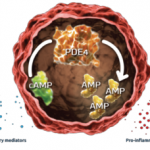NEW YORK (Reuters Health)—Apremilast improves clinical outcomes in patients with psoriatic arthritis and active psoriasis, according to results from the PALACE 3 randomized controlled trial.
Apremilast, a phosphodiesterase 4 (PDE4) inhibitor, showed efficacy against psoriatic arthritis in the PALACE 1 trial.
Dr. Christopher J. Edwards from University Hospital Southampton in the U.K. and colleagues evaluated apremilast treatment in 505 patients with active psoriatic arthritis, including current skin involvement, despite prior therapy with conventional disease-modifying antirheumatic drugs and/or biologic agents.
In the double-blind phase, patients were randomized to receive twice-daily treatment of 20 or 30 mg apremilast or placebo until Week 16. At that point, nonresponders in the placebo group (those who had not improved their swollen joint count or tender joint count by at least 20%) were rerandomized to 20 or 30 mg apremilast twice daily. Everyone else continued on their initial apremilast dose.
At Week 24, all remaining placebo patients were randomized to 20 or 30 mg apremilast twice daily.
At Week 16, significantly more 20 mg apremilast patients (28%) and 30 mg patients (41%) than placebo patients (18%) had achieved an ACR20 response (p<0.0001).
Also at Week 16, the 30 mg apremilast group had significant improvements in the Health Assessment Questionnaire-Disability Index (HAQ-DI), the fraction of patients achieving at least 50% improvements in the Psoriasis Area and Severity Index (PASI), the 28-joint disease activity score (DAS-28) and global assessments of disease activity. Tender joint counts had improved in both apremilast groups.
The therapeutic effects of apremilast were sustained through Week 52 in patients continuing therapy, and treatment effects observed in patients originally randomized to placebo and then randomized to apremilast at Weeks 16 or 24 were similar to those in patients originally randomized to apremilast.
Most adverse events were mild or moderate in severity and 8% of patients or fewer in any treatment group discontinued the study because of adverse events, according to the Jan. 20 Annals of the Rheumatic Diseases online report.
Based on the significant efficacy of the 30 mg apremilast dosing in PALACE 3 in several domains of psoriatic arthritis, “apremilast represents a new oral treatment option, with a unique mode of action, for patients with PsA,” the researchers concluded.
Dr. Edwards did not respond to a request for comments.
Celgene Corporation funded the trial, employed three coauthors, and had various relationships with four other coauthors.



